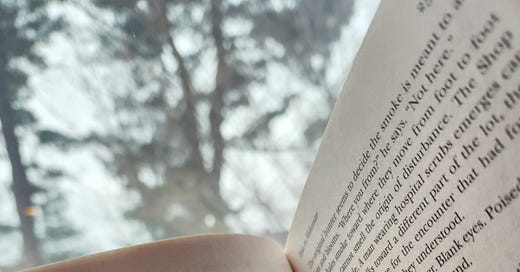This story was not what I expected it to be. (I really need to write a post on expectations. Maybe this weekend.) But it was unexpected in a good way; I can see why editor Lauren Groff, who said she was looking for something unusual, chose it for The Best American Short Stories. I don’t want to spoil anything for you if you haven’t read “Viola in Midwinter” because if you have the collection on hand, please read this one. I’ll just say that Bertino is working with some very old tropes here that make it difficult to do something new—and yet, I think she does. Plus, she knows how to write at the sentence level. I don’t think quoting this paragraph will spoil anything:
That evening, Viola wakes, struggling for breath. Her sheets are soaked in sweat. The wind swirling in the hollow sounds like a passing big rig. Gun powder fills her nostrils. She checks outside but there’s no one in the meadow blanketed with snow, or on the hill milked in the waxing Wolf Moon. No deer lolls in the copse of hemlock that stubbles the crest. More icicles have grown from the gutters. One side of the house shines in the dark.
This is partly a story about the invisibility of older women—maybe it’s not an accident that theme keeps turning up in my reading? It’s also about time and human connections. It reminds me a little bit of Virginia Woolf’s Orlando. I was surprised to find a couple of lines that made me not quite laugh out loud, but at least smile. Even the last page of the story surprised me because, again, Bertino is playing with a trope that makes you think you know what you’re going to get. Finally, one true mark of a well-written story is that when you go back to the first page and reread it, more is revealed, as was the case with this one. OK, enough said.
I look forward to reading a few more stories from the 2024 edition of The Best American Short Stories. If I find a really good one, I’ll share it with you somewhere down the road.
Did you read “Viola in Midwinter”? If so, what did you think of it? If not, what are you reading this week? Let us know in the comment section below!





This week: I read one more chapter in Peter Enn's Curveball for a church group.
I'm still dipping into Amy Nemecek's book of poetry The Language of Birds and Other Poems. Also waiting at the library for more dipping is Mary Oliver's Poetry Handbook.
Earlier this week I browsed at the library for something lighter between those Puerto Rico books and starting Tim Alberta's The Kingdom, the Power, and the Glory: American Evangelicals in an Age of Extremism next week with another church group. I came home with The Healing Season of Pottery by Korean author Yeon Somin, translated by Clare Richards and Improbable Libraries: A Visual Journey to the World's Most Unusual Libraries by Alex Johnson.
I need to get this collection! I just got back from a transatlantic trip, so I read a lot! High point in a difficult way was The Vegetarian by Korean Nobel winner Han Kang. It has stayed with me for a few days. I'm currently reading Yellowface by R.F. Kuang, a very interesting reflection on who should tell whose stories, especially thinking of white authors telling the stories of other races. It's not as simple as you think it might be in her telling! This is a departure for an author who usually writes historical fantasy/sci fi.